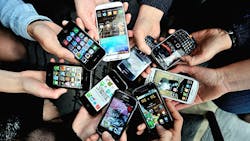About four years ago, stuck for an idea for a Christmas gift, I seriously considered buying a personal navigation device, one of those handheld GPS tools that for a time topped many “What’s Cool” lists and held the imagination of gadget aficionados. I never have been one of those types, but I needed something clever and memorable for a loved one, and the marketing jingle — a beguiling review of all the device’s marvelous features, sung to the Carol of the Bells — had me almost convinced that would do the trick.
Now it turns out that GPS devices were just another momentary technical marvel, a casualty in the subsequent rise of smartphones and their app-driven multi-functionality. People don’t need a separate gadget when that computer in their hands has navigational capability and so much more. Now the jingle is the only memorable aspect of a once omnipresent product.
That adaptive quality of smartphones (and tablets) has many tech enthusiasts convinced they have arrived at their moment of bliss – one technology through which to drive all their peripatetic interests, giving them autonomy to engage and disengage functions, to define what information they see and receive, to amuse themselves at will, to lose themselves in their own preferences.
Smartphones and tablets are a convergence of technology and consumerism, and a kind of endpoint for each one: the one thing everyone wants to buy now is a “more awesome” update of the same technology, and all consumer marketing is based on finding channels through the smart platforms to targeted customers.
So, count me as shocked to learn that the end has been forecast for smartphones and tablets. According to a market research study sponsored by electronics developer Ericsson, many consumers believe smartphones will be obsolete within five years because they’re too inconvenient, apparently.
“A smartphone in the hand (is) really not that practical, for example, not when one is driving a car or cooking,” according to Rebecka Ångström of Ericsson ConsumerLab. “And, there are many situations where display screens are not so good. Therefore, one in two (consumers) think that smartphones will belong to the past within five years.”
Entertainment and shopping, according to this analysis, are the two pillars of smart technology, notwithstanding the advantages that information, speed, and mobility bring to other areas of human activity (e.g., industry and manufacturing, just to be clear.) Ericsson predicts a series of functional developments as smart technology gives way to Artificial Intelligence, all of them keying on users’ desire for more convenience and amusement.
Well, I was wrong five years ago so I cannot gainsay the research now, but it’s clear that what is being analyzed is not smart technology but human nature. We are needy, impatient, demanding, and unwilling to sacrifice time or energy to achieve even simple tasks. We want what we desire immediately, without explanation or effort. The computers in our hands are slaves for us to command. Nearly everyone is a gadget aficionado now.
Perhaps, in five years, smart devices will have given way to Artificial Intelligence, but I am confident that will not last either, if only because the master-slave arrangement is always unsupportable. We believe ourselves to be intelligent and civilized now, but we will be surprised at how much more we can accomplish, how much more satisfied we could be, once we revive authentic autonomy.
About the Author
Robert Brooks
Editor/Content Director - Endeavor Business Media
Robert Brooks has been a business-to-business reporter, writer, editor, and columnist for more than 20 years, specializing in the primary metal and basic manufacturing industries. His work has covered a wide range of topics including process technology, resource development, material selection, product design, workforce development, and industrial market strategies, among others.
Currently, he specializes in subjects related to metal component and product design, development, and manufacturing—including castings, forgings, machined parts, and fabrications.
Brooks is a graduate of Kenyon College (B.A. English, Political Science) and Emory University (M.A. English.)

